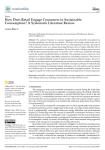Balan C. (2021). How does retail engage consumers in sustainable consumption? A systematic literature review. Sustainability, 01/01/2021, vol. 13, n. 1, p. 1-25.
https://doi.org/10.3390/su13010096
https://doi.org/10.3390/su13010096
| Titre : | How does retail engage consumers in sustainable consumption? A systematic literature review (2021) |
| Auteurs : | C. Balan |
| Type de document : | Article |
| Dans : | Sustainability (vol. 13, n. 1, January 2021) |
| Article en page(s) : | p. 1-25 |
| Langues : | Anglais |
| Langues du résumé : | Anglais |
| Catégories : |
Catégories principales 11 - COMMERCE ; 11.2 - Commercialisation. DistributionThésaurus IAMM COMMERCE ; PRODUIT ALIMENTAIRE ; MARKETING ; COMPORTEMENT DU CONSOMMATEUR ; VENTE AU DETAIL ; CONSOMMATION RESPONSABLE ; DEVELOPPEMENT DURABLE ; CONSOMMATEUR |
| Résumé : | The academic literature on consumer engagement and sustainable consumption has developed gradually over the last two decades. The body of knowledge related to the role of food and non-food retailers in this context, however, is only beginning to develop. The purpose of this systematic review is to analyse the existing literature on how retailers fulfil their role in engaging consumers in sustainable consumption. The need for a study with this purpose is proven by the fact that academic literature lacks a systematic review on this topic, despite the ascending trend in the number of published articles in the field. This systematic review is based on a five-step process to ensure quality, replicability, transparency, and reliable conclusions. The reviewed articles were published relatively recently in academic journals from different domains. This review identified seven distinct types of retail marketing interventions (involvement of retailers in marketing actions with the aim to engage consumers in sustainable consumption), 30 types of retail marketing mechanisms (consisting in marketing strategies, techniques, tools, and channels used by retailers), and 14 distinct types of consumer engagement in sustainable consumption patterns. The review suggests an agenda for further research and identifies practical implications for retail management. |
| Cote : | En ligne |
| URL / DOI : | https://doi.org/10.3390/su13010096 |







